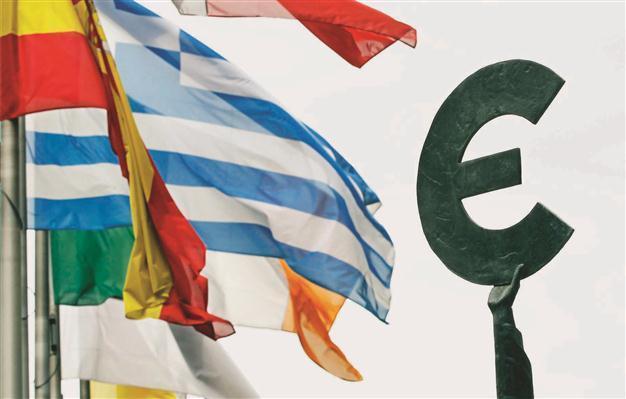Credit warning gives Europe one last chance to ease debt
PARIS - Agence France-Presse

European national flags flutter near an euro symbol outside the EU Parliament in Brussels in this file photo. Standard & Poor’s has warned it may carry out an unprecedented mass downgrade of eurozone countries. REUTERS photo
A shock warning that almost the entire eurozone, including Germany, is sliding towards a debt downgrade, left EU leaders with just three days yesterday to bridge big splits over the debt crisis.It also put an icy hand around confident statements by German Chancellor Angela Merkel and French President Nicolas Sarkozy - ahead of an EU summit on Thursday and Friday - that they want treaty changes to enforce budget discipline.
Paris and Berlin, the pillars of the eurozone, did not explain how confidence on financial markets can be shored up during the uncertainty of the many months needed for treaty changes, either at the level of the eurozone or of the 27-member European Union.
The warning that Germany and France and 13 other members of the 17-nation eurozone are now on negative credit watch came from Standard & Poor’s credit rating agency overnight, raising the stakes of this week’s EU summit.
“On Thursday and Friday we will take the decisions which we consider important, indispensable, for the eurozone,” Merkel said yesterday, responding to the S&P warning. “I have always said it’s a long process which will still last a long time. But this path is now mapped out ... we will continue on this path.”
German Finance Minister Wolfgang Schaeuble said that the S&P warning was the ‘best incentive possible’ for the EU summit, but the head of the eurozone finance ministers, Jean-Claude Juncker, expressed anger while acknowledging that the warning was a setback.
“I find it completely over the top and also unfair,” Juncker told Germany’s Deutschlandfunk radio. “After the very substantial efforts in the eurozone in recent days to get the debt crisis under control... this warning comes as a crushing blow.”
S&P said “major downside risks” included a deep recession in Europe and the United States, higher protectionism and persistent inflation.
Investors sell equities
In Germany, where the warning of a downgrade is a particularly stark measure of fallen fortunes, the main stock index opened with a drop of about 1.4 percent, to regain some lost ground later.
On the European bond market, where governments borrow to fund their debt, German and French bonds came under some tension. The yield for 10-year German bonds rose to 2.257 percent from 2.2 percent late on Monday and for France to 3.243 percent from 3.123 percent.
Asian stock markets fell by 1-1.5 percent yesterday. The S&P warning, coupled with notice that the agency would complete a review of eurozone sovereign ratings “as soon as possible” after the summit, contrasted with the tone of the declarations by Germany and France, the pacesetters in the European Union, after a meeting on Monday.
Reacting later to the S&P warning, France and Germany confirmed “their determination to take all the necessary measures, in liaison with their partners and the European institutions to ensure the stability of the euro area.”
Yesterday, France repeated that the French-German plan announced Monday was the response to S&P.
But in Washington, Christine Lagarde, head of the International Monetary Fund said Monday’s German-French statement was “not in itself sufficient and a lot more will be needed ... for confidence to return.”
Sarkozy and Merkel on Monday backed automatic sanctions against any EU member state allowing its public deficit go above 3 percent of gross domestic product. They also called for a “reinforced and harmonized golden rule” on deficits, which could oblige some states to enshrine the commitment to balance their public finances in their legislation.
The new rules would be enshrined in a rewritten EU treaty signed by all 27 EU members or, as an alternative, by just the 17 eurozone members with the other nations signing on a voluntary basis.
















